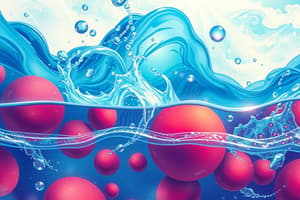Podcast
Questions and Answers
What is the goal of the Fluid Thioglycollate Broth test?
What is the goal of the Fluid Thioglycollate Broth test?
To successfully perform a Fluid Thioglycollate Broth test, to learn how to determine the results of this test, and to determine the results of this test for the student's environmental unknown.
Which of the following materials are used in the Fluid Thioglycollate Broth test? (Select all that apply)
Which of the following materials are used in the Fluid Thioglycollate Broth test? (Select all that apply)
- Oxygen masks
- Bunsen Burner (correct)
- Lysol cleaning solution (correct)
- Paper towels (correct)
What is the first step to prepare for the Thioglycollate broth inoculation procedure?
What is the first step to prepare for the Thioglycollate broth inoculation procedure?
Sterilize the workbench with the Lysol cleaning solution.
What should you use to mark the indicator line in the Thioglycollate broth?
What should you use to mark the indicator line in the Thioglycollate broth?
What does it indicate if the broth shows growth from top to bottom?
What does it indicate if the broth shows growth from top to bottom?
What does it indicate if primary growth is in the fully oxygenated zone?
What does it indicate if primary growth is in the fully oxygenated zone?
What is the purpose of the indicator in the Thioglycollate broth?
What is the purpose of the indicator in the Thioglycollate broth?
What is Fluid Thioglycollate broth (FTB)?
What is Fluid Thioglycollate broth (FTB)?
What types of organisms is Fluid Thioglycollate broth particularly well adapted for?
What types of organisms is Fluid Thioglycollate broth particularly well adapted for?
What key components are found in Fluid Thioglycollate broth?
What key components are found in Fluid Thioglycollate broth?
What role do sodium thioglycollate and L-cystine play in FTB?
What role do sodium thioglycollate and L-cystine play in FTB?
What does resazurin do in fluid Thioglycollate broth?
What does resazurin do in fluid Thioglycollate broth?
What color is resazurin when it is oxidized?
What color is resazurin when it is oxidized?
What color is resazurin when it is not oxidized?
What color is resazurin when it is not oxidized?
A small amount of agar is included in FTB to slow oxygen diffusion.
A small amount of agar is included in FTB to slow oxygen diffusion.
The oxygen removed during autoclaving of fluid thioglycollate broth will diffuse back into the medium as the tubes cool to room temperature.
The oxygen removed during autoclaving of fluid thioglycollate broth will diffuse back into the medium as the tubes cool to room temperature.
What does fresh FTB appear like?
What does fresh FTB appear like?
What describes aerotolerant anaerobes?
What describes aerotolerant anaerobes?
What defines a facultative anaerobe?
What defines a facultative anaerobe?
What is a strict anaerobe?
What is a strict anaerobe?
What characterizes a strict aerobe?
What characterizes a strict aerobe?
What is a microaerophile?
What is a microaerophile?
Study Notes
Fluid Thioglycollate Broth Test Overview
- Aims to master the Fluid Thioglycollate Broth test for analyzing environmental unknowns.
Materials Needed
- Essential items include Lysol cleaning solution, paper towels, sharpie, rubber gloves, inoculating loop, Bunsen burner, environmental unknown culture, and Thioglycollate broth.
Preparation Methods
- Start by sterilizing the workbench and washing hands before donning gloves.
- Label sterile media with your name, section, date, and unknown being used.
- Arrange materials for efficient access during the experiment.
Inoculation Procedure
- Use a Thioglycollate broth tube with minimal oxygenation.
- Mark the oxygenated zone with a sharpie. Keep the broth upright and avoid mixing.
- Prepare to aseptically obtain a sample and maintain the broth tube's stability during inoculation.
- Replace the cap carefully to avoid contamination, marking visible bacterial growth spots for post-lab.
Result Interpretation
- Examine the inoculated broth against light to assess growth patterns.
- Growth throughout the broth indicates a facultative anaerobe, capable of thriving with or without oxygen.
- Concentrated growth in the oxygenated zone with no sediment in the non-oxygenated area suggests an aerobe, which requires oxygen.
- Small amounts of growth in various zones may imply aerotolerant anaerobes, which can endure oxygen but do not utilize it.
Thioglycollate Broth Properties
- Acts as a base medium for diverse aerobic and anaerobic organisms.
- Ideal for strict anaerobes and microaerophiles based on nutrient requirements and oxygen tolerance.
Key Components
- Contains yeast extract and pancreatic digest of casein for nutritional support.
- Sodium thioglycollate and L-cystine serve to reduce oxygen levels to water.
- Resazurin functions as an oxidation indicator, changing from pink (oxidized) to yellow (reduced).
Special Conditions
- FTB includes a small amount of agar to slow oxygen diffusion, preventing rapid changes.
- Oxygen diffused back into the broth after autoclaving creates a gradient from aerobic at the top to anaerobic at the bottom.
Fresh Broth Appearance
- Fresh Thioglycollate broth appears clear to straw-colored, with a pink oxidized layer at the top.
Microbial Growth Classifications
- Aerotolerant anaerobes thrive in the presence of oxygen but do not use it for metabolism.
- Facultative anaerobes prefer oxygen-rich environments but can survive without it.
- Strict anaerobes are unable to survive in oxygen-rich atmospheres.
- Strict aerobes require oxygen for growth and metabolic processes.
- Microaerophiles thrive in lower-than-normal atmospheric oxygen concentrations.
Studying That Suits You
Use AI to generate personalized quizzes and flashcards to suit your learning preferences.
Description
These flashcards cover key concepts related to the Fluid Thioglycollate Broth test, including its goals and necessary materials. They are designed to help students understand how to perform the test and interpret the results effectively for their environmental unknown cultures.




